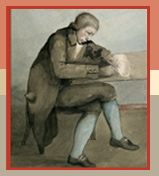
Iolo's Life
Autobiographical material (NLW 21387E)
The Agricultural Observer and Farmer
Iolo Morganwg: the Unitarian
Iolo Morganwg was baptized, married and buried in different Anglican churches in the Vale of Glamorgan. Yet, from the early 1790s until his death in 1826 he was a strongly anti-establishment and anti-clerical Unitarian. Indeed, he proudly claimed to have been the founder of the Unitarian Society of South Wales (1802).
From the 1770s onwards his heterodox tendencies had been encouraged by Dissenting ministers and craftsmen in Glamorgan, and his imprisonment in 1786-7 did not deepen his respect for the political and religious status quo. His frequent visits to Bristol and London nurtured a greater sense of independence and an attachment to liberty, anti-trinitarianism and reform. He allied himself with the Unitarians of Essex Street, London, and made himself known to the likes of David Williams, Joseph Priestley and Theophilus Lindsey.
In Wales, he and Thomas Evans (Tomos Glyn Cothi) became the most vocal and aggressive Rational Dissenters of the 1790s. Through the Gorsedd, the eisteddfod and the printing press, they defied champions of 'Church and King' and revelled in the principles of the French Revolution.
In 1802 Iolo was prominent in the founding of the Unitarian Society of South Wales and campaigned furiously on its behalf until and after Unitarianism was made legal in 1813. He organized preaching tours for leading anti-trinitarians, crossed swords with bishops like Thomas Burgess, bishop of St David's, and published a collection of hymns and psalms entitled Salmau yr Eglwys yn yr Anialwch (1812). In his native Glamorgan and in 'Y Smotyn Du' (the Black Spot) in rural Cardiganshire and Carmarthenshire he was feted as the 'father' of the Unitarian movement. 'Remember', he once wrote, 'as I have long lived so will I die in the unshaken belief of the doctrines of Unitarian Christianity.'


